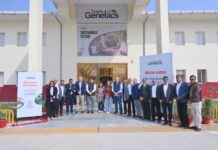SIG recently announced that it would fund breakthrough research into more sustainable materials at EPFL, the Swiss Federal Institute of Technology in Lausanne, Switzerland, as part of a joint initiative with Nestlé, Logitech and other industry partners to tackle environmental challenges associated with plastic waste.
“Sustainable product innovation is at the heart of SIG’s commitment to go way beyond good for society and the environment,” said Klaus Andresen, senior vice president of Global Technology at SIG. “We already offer customers some of the most sustainable aseptic packaging solutions on the market. But we want to go further and that’s why we’re partnering with Nestlé and others to drive progress towards the sustainable packaging materials of the future.”
Driving research into sustainable materials
Together, the corporate partners have committed to providing Swiss franc 5 million (approximately Rs 40 crore) over ten years. The funding will support a new chair for sustainable materials research within EPFL’s Institute of Materials.
According to the company’s press statement, the chair, to be appointed as a tenure-track assistant professor, will be responsible for developing and implementing a new research program on sustainable materials at EPFL, one of Europe’s most vibrant and cosmopolitan science and technology institutions.
Research areas of interest will address critical questions such as the overall environmental impact of materials, the exploration of bio-based, bio-degradable and recyclable materials, including high-performance paper-based barrier materials, that could help to address environmental concerns about plastic packaging.
Stefan Palzer, Nestlé chief technology officer, said, “Tackling plastic pollution is a top priority for Nestlé. We continue our efforts to pilot novel approaches for re-use packaging, while also evaluating new recycling technologies and sustainable packaging materials. The development of high performing, environmentally friendly materials requires a fundamental understanding of material structures and properties, which is why we are collaborating with our innovation partners to invest in sustainable material research at EPFL.”
Supporting customers with sustainable solutions
The company states that beverage cartons are fully recyclable and have a much lower environmental footprint than many alternatives for long-life food and beverages such as milk, juice, or soups. They are made mainly from renewable paperboard, but small amounts of polymers and aluminum foil are usually needed as barrier layers to contain and protect liquid food products, and for caps and closures.
SIG already offers an innovative aluminum-free aseptic packaging for dairy products, known as combibloc EcoPlus, and its SIGNATURE PACK solution uses a mass balance approach to link the polymers used in the carton to 100% renewable, forest-based feedstock. The company is now working to create an aseptic pack made out of 100% renewable materials – without mass balancing or aluminum – that can be used for a range of products, including juices that are more sensitive to light and oxygen.
Supporting research into more sustainable, high-performance barrier materials will help SIG drive progress towards this goal as it works in partnership with customers to bring food products to consumers around the world in a safe, sustainable and affordable way.
IndiFoodBev — authentic, impactful and influential
An English-language food and beverage processing and packaging industry B2B platform in print and web, IndiFoodBev is in its third year of publication. It is said that the Indian food and beverage industries represent approximately US$ 900 billion in revenues which implies more than 20% of the country’s GDP. Eliminating the wastage on the farmside can help to deliver more protein to a higher number of the population apart from generating sizable exports. The savings in soil, seeds, water, fertilizer, energy and ultimately food and nutrition could be the most immense contribution that country is poised to make to the moderation of climate change.
To improve your marketing and grow sales to the food and beverage processing and packaging industry, talk to us. Our research and consulting company IppStar [www.ippstar.org] can assess your potential and addressable markets in light of the competition. We can discuss marketing, communication, and sales strategies for market entry and growth.
Suppliers and service providers with a strategy and budget for targeted marketing can discuss using our hybrid print, web, video, and social media channels to create brand recognition linked to market relevance. Our technical writers are ready to meet you and your customers for content.
The second largest producer of fruit and vegetables in the world is continuously expanding processing capacities and delivery systems with appropriate innovative technologies. We cover product and consumer trends, nutrition, processing, research, equipment and packaging from farm to thali. Get our 2025 media kit and recalibrate your role in this dynamic market. Enhance your visibility and relevance to existing markets and turn potential customers into conversations. Ask for a sample copy of our bi-monthly in print or our weekly IndiFoodBev eZine each Wednesday.
For editorial info@ippgroup.in — for advertisement ads1@ippgroup.in and for subscriptions subscription@ippgroup.in
Naresh Khanna – 10 February 2025
Subscribe Now










